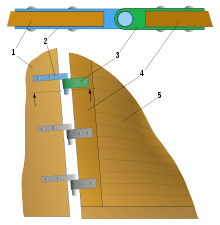gudgeon
English
Pronunciation
- IPA(key): /ˈɡʌdʒən/
Etymology 1
From Middle English gojune, from Anglo-Norman goujon, from Late Latin, gobionem, accusative of gobio, from Latin gobius (“gudgeon”)
Noun
gudgeon (plural gudgeons)
- A small freshwater fish, Gobio gobio, that is native to Eurasia.
- c. 1596, William Shakespeare, The Merchant of Venice, Act I, Scene 1,
- I'll tell thee more of this another time: / But fish not, with this melancholy bait, / For this fool gudgeon, this opinion.
- 1653, Izaak Walton, The Compleat Angler, Chapter 15,
- The gudgeon is reputed a fish of excellent taste, and to be very wholesome.
- 1684, Samuel Butler, Hudibras, Part II, Canto III, lines 921-4,
- […] Make fools believe in their foreseeing / Of things before they are in being / To swallow gudgeon ere th' are catch'd; / And count their chickens ere th' are hatch'd […]
- 1912, Fyodor Dostoyevsky, The Brothers Karamazov (1880), translated by Constance Garrett, Part I, Book II, Chapter 6,
- You save your souls here, eating cabbage, and think you are the righteous. You eat a gudgeon a day, and you think you bribe God with gudgeon.
- c. 1596, William Shakespeare, The Merchant of Venice, Act I, Scene 1,
- (Australia) Any of various similar small fish of the family Eleotridae, often used as bait.
- 2012, Nicola Gage, "Murray showing signs of recovery," ABC News, 3 October, 2012,
- The southern purple-spotted gudgeon can be hard to find. Although colourful, they are thin and only grow up to 12 centimetres.
- 2012, Nicola Gage, "Murray showing signs of recovery," ABC News, 3 October, 2012,
- An idiot; a person easily duped or cheated.
- 1713, Jonathan Swift, Imitation of Horace to Lord Oxford,
- The doctor now obeys the summons, / Likes both his company and commons; / Displays his talent, sits till ten; Next day invited, comes again; / Soon grows domestic, seldom fails, / Either at morning or at meals; / Came early, and departed late; / In short, the gudgeon took the bait.
- 1713, Jonathan Swift, Imitation of Horace to Lord Oxford,
Synonyms
- (fish of the family Eleotridae): sleeper goby
Translations
Fish, Gobio gobio
|
|
fish of the family Eleotridae
|
|
idiot
|
Further reading

Etymology 2

Pintle and gudgeon rudder system.
From Middle English gudyon, ultimately from Late Latin gulbia (“chisel”).
Noun
gudgeon (plural gudgeons)
- A type of bearing: a circular fitting, often made of metal, which is fixed onto some surface and allows for the pivoting of another fixture.
- 1719, Daniel Defoe, chapter 5, in Robinson Crusoe:
- […] as to a wheelbarrow, I fancied I could make all but the wheel; but that I had no notion of; neither did I know how to go about it; besides, I had no possible way to make the iron gudgeons for the spindle or axis of the wheel to run in […]
-
- (nautical) Specifically, in a vessel with a stern-mounted rudder, the fitting into which the pintle of the rudder fits, allowing the rudder to swing freely.
- 1792, William Bligh, A Voyage to the South Sea, Chapter 7, 3 November, 1788,
- This afternoon the gudgeon of the rudder belonging to the large cutter was drawn out and stolen without being perceived by the man that was stationed to take care of her.
- 1792, William Bligh, A Voyage to the South Sea, Chapter 7, 3 November, 1788,
Derived terms
- gudgeon pin
Translations
fitting into which the pintle of the rudder fits
|
Verb
gudgeon (third-person singular simple present gudgeons, present participle gudgeoning, simple past and past participle gudgeoned)
- To deprive fraudulently; to cheat; to dupe.
- 1826, Walter Scott, Woodstock, Chapter 16,
- " […] I have seen when you were willing […] to be treated thus ungratefully—and gudgeoned of the opportunities which had been given you"—
- 1826, Walter Scott, Woodstock, Chapter 16,
This article is issued from
Wiktionary.
The text is licensed under Creative
Commons - Attribution - Sharealike.
Additional terms may apply for the media files.
